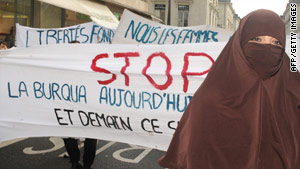French senate approves burqa ban
September 14, 2010 -- Updated 1855 GMT (0255 HKT)

A woman wearing a niqab veil participates in a protest against a ban earlier this year in Tours, central France.
Paris, France (CNN) -- The French senate approved Tuesday a law banning any veils that cover the face -- including the burqa, the full-body covering worn by some Muslim women -- making France the first European country to plan such a measure.
The law passed by a vote of 246 to 1, with about 100 abstentions coming essentially from left-leaning politicians.
The legislation was overwhelmingly approved by the lower house of parliament in July and will go into effect next spring.
French people back the ban by a margin of more than four to one, the Pew Global Attitudes Project found in a survey earlier this year.
Some 82 percent of people polled approved of a ban, while 17 percent disapproved. That was the widest support the Washington-based think tank found in any of the five countries it surveyed.
Clear majorities also backed burqa bans in Germany, Britain and Spain, while two out of three Americans opposed it, the survey found.
A panel of French lawmakers recommended a ban last year, and lawmakers unanimously passed a non-binding resolution in May calling the full-face veil contrary to the laws of the nation.
"Given the damage it produces on those rules which allow the life in community, ensure the dignity of the person and equality between sexes, this practice, even if it is voluntary, cannot be tolerated in any public place," the French government said when it sent the measure to parliament in May.
The law imposes a fine of 150 euros ($190) and/or a citizenship course as punishment for wearing a face-covering veil. Forcing a woman to wear a niqab or a burqa will be punishable by a year in prison or a 15,000-euro ($19,000) fine, the government said, calling it "a new form of enslavement that the republic cannot accept on its soil."
The French Council of State has warned that the ban could be incompatible with international human rights laws and the country's own constitution. The council advises on laws, but the government is not required to follow its recommendations.
The ban pertains to the burqa, a full-body covering that includes a mesh over the face, and the niqab, a full-face veil that leaves an opening only for the eyes. The hijab, which covers the hair and neck but not the face, and the chador, which covers the body but not the face, apparently are not banned by the law.
However, a 2004 law in France bans the wearing or displaying of overt religious symbols in schools -- including the wearing of headscarves by schoolgirls.
The Pew Forum on Religion & Public Life estimates that France has about 3.5 million Muslims, or about 6 percent of the population.
France does not keep its own statistics on religious affiliation of the population, in keeping with its laws requiring the state to be strictly secular.
CNN's Saskya Vandoorne contributed to this report.

No comments:
Post a Comment